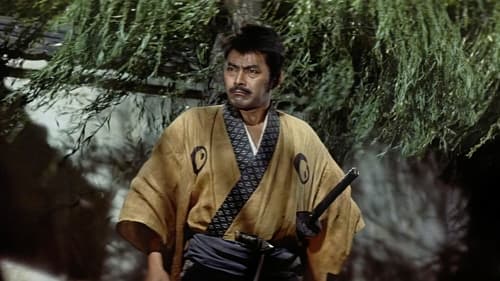
Esta impresionante historia épica ha sido a veces etiquetada como la versión japonesa de "Lo Que El Viento Se Llevó". Chusha Ichikawa personifica a un señor feudal poderoso y despiadado que lucha contra el virtuoso y joven noble, Yuzo Kayama. Ichikawa encuentra una victoria parcial cuando engaña a Kayama y lo convence de hacerse el Hara Kiri. La venganza será realizada por los cuarenta y siete samuráis de Kayama. Basada en una leyenda japonesa venerable, la historia de Chushingura ha sido filmada en varias ocasiones, pero sólo la versión de 1941 (47 Ronin) estuvo a la altura de la versión de 1962, del gran director Hiroshi Inagaki.
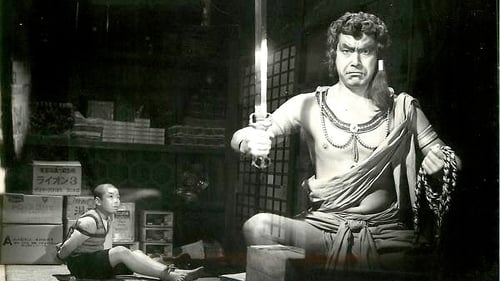
Gen is a lonely orphan boy. His sole sense of companionship comes from an imaginary friend, the god Prince Fudo-Myo. Prince Fudo-Myo comes to the boy's rescue in times of difficulty.

A skilled country doctor's talents are such that he can even perform operations as difficult and novel as removing a patient's kidney for the first time in Japan. Unfortunately for him, however, his wife's addiction to gambling is of such a magnitude that he is down to selling his underwear to make money. The image sticks and he becomes known as the 'underwear doctor.' On the other hand, his successful surgery's patient is so grateful he himself wants to become a physician.
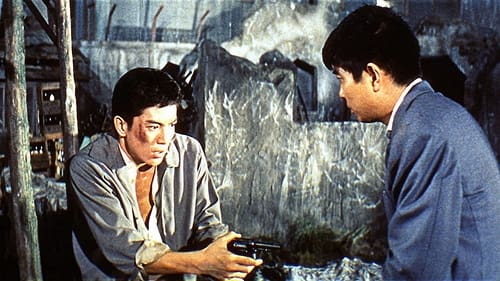
Seven years ago, Ishimatsu Toshio, a talented radio producer at Zen Nihon Hōsō, witnessed a crazed drug addict murder his wife and then commit suicide, though Toshio was able to save the lives of their two children. Just transferred from Shimizu to Tokyo, Toshio hopes to produce a program that will expose the drug trade in Tokyo. One day, Toshio stops into a noodle shop where he is mistaken for a drug dealer and passed a bagful of drugs. The real dealer arrives in time to follow Toshio home. That night Toshio is attacked by the dealer, who turns out to be Kenji, one of the children Toshio had saved. Kenji can't bring himself to kill Toshio, so he runs away and goes into hiding from the mafia. While continuing to investigate the drug trade, Toshio searches for Kenji to get Kenji's testimony for his program.

While in vacation in a sea side house, a young man fall in love with a beautiful woman who pretends to live by herself in the sea. The fishermen of a nearby village think she is a monster, the female of a shark killed many years before, responsible for many disappearances.
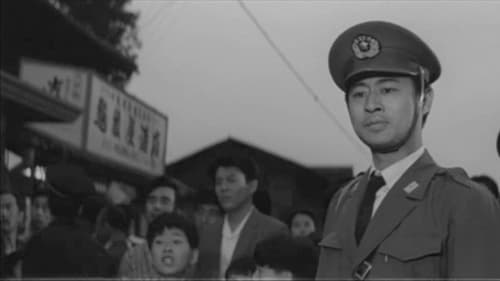
A man is wrongfully accused of murder.

Tamekichi
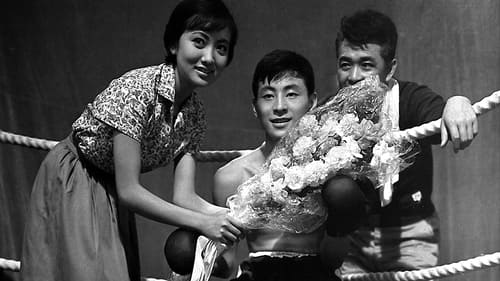
Rokunosuke Komatsu
Former boxer Daishiro lost his wife, and his only son, Kaoru, went missing, it was a heavy blow for Daishiro. One day, Daishiro got a call from his relative Morihiko. He said he forgot the winning lottery ticket of 2 million yen at the hotel, so he wants Daishiro to go and pick it up. Morihiko used the hotel for secret meetings, so he said he couldn't go there himself because he was afraid it would become public. When Daishiro entered the hotel, the Yakuza, who learned about the lottery from the newspaper, threaten the hotel maid Noriko, and want to rob her. Daishiro helps Noriko and safely picks up the lottery, but a message arrives from his relative Seikichi from Osaka. His missing son Kaoru is said to be a boxer in Osaka. "My son... He has the blood of a boxer in him..." Daishiro is heading to Osaka in a hurry...

1957 crime film

Kanzô
A blind masseur visits a samurai to request the return of a loan. The samurai kills him in anger, then has his servant dump the body in the Kasane swamp. However, the ghost of the masseur returns to haunt the samurai, who kills his wife by mistake and then goes to the swamp and drowns himself. 20 years later, the masseur's daughter unknowingly falls in love with the samurai's son who has been brought up to be a servant. After she is horribly disfigured in an accident, he plots to run away with another woman, but the path of their escape lies by the Kasane swamp...
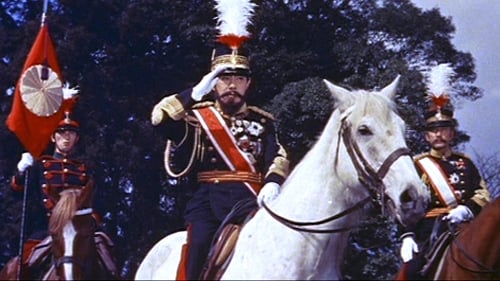
Meiji Tenno portrayed the ramp up to the Russo-Japan War. In addition to showing the political events that led to war, it also showed the era from the story of a farm family in rural Japan who sent their son off to war. As such, it could be considered an anti-war movie, showing how, while war is devised by governments, the people do not really understand what war is, and it's combatants often do not know what they are fighting for.
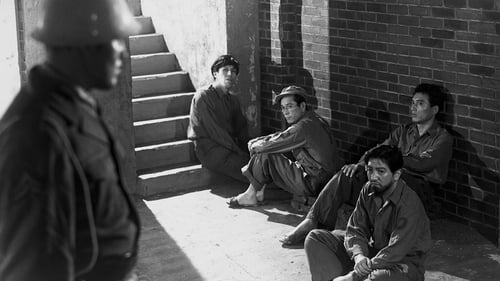
A group of rank-and-file Japanese soldiers are jailed for crimes against humanity, themselves victims of a nation refusing to bear its burdens as a whole.

Tokubei
Ryutaro is a spy employed by the shogun Tokugawa Iemitsu, who is the target of assassination attempts that aim to hand power over to his younger brother Tadanaga. Before learning of these plots, Ryutaro discovers himself in a predicament of his own when he rushes to the defence of a local girl who is caught between her boyfriend and a greedy businessman. The situation results in many violent one-on-one skirmishes between Ryutaro and the businessman’s many samurai defendants, one of whom enigmatically refuses to reveal his face or use more than just the one hand. Before long, Ryutaro’s top priority is not protecting Iemitsu as it should be, but rather unearthing the true identity of the mystery samurai.

Oiwa has been searching for the one who killed her father for a long time. She comes to Yedo and sees a man named Naosuke. The film is based on the kabuki classic: Toukaidou Yotsuya Kaidan (1826) written by Tsuruya Nanboku and is one of the most famous ghost stories throughout Japan.

Kusuo Abe stars in this kaidan.
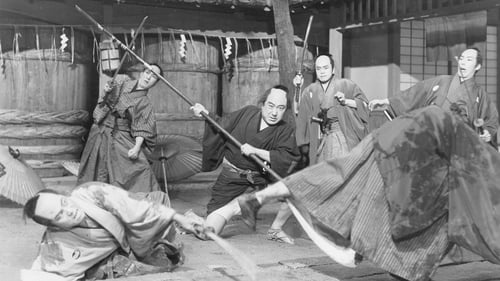
Road movie tragicómica ambientada durante el período Edo. La historia de un samurái, sus dos sirvientes, incluido el portador de lanzas Genpachi, y las diversas personas que conocen en su viaje, incluido un policía que persigue a un ladrón, un niño pequeño y una mujer que será vendida como prostituta.

Movie version of NHK renzoku drama "Tokyo Romance"

A wandering Jirocho stumbles upon his wife's possible murder and has other adventures while on the run.

Japanese comedy film.

After mastering swordsmanship at the dojo of Chiba Shusaku, and unable to serve a clan due to his illness, Hirate Miki becomes a ronin who winds up as bodyguard to Shigezo of Sasagawa leading up to an epic battle.

Japanese drama film.

Jidai-geki about the life of Yasubei Nakayama, a famous ronin who did participate in the revenge against Lord Kira Yoshinaka as detailed in Japan's famous epic Chushingura
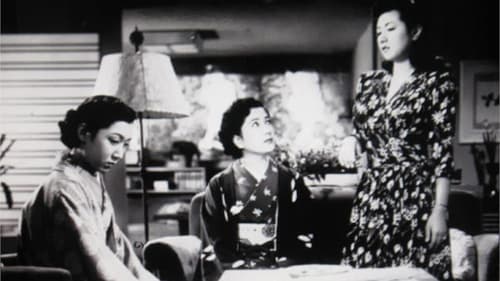
Itakura's father

Tanuma Kandayuu is a high class samurai of the house of Nabeshima. He finds a lavish board of Go (a Chinese Board game) at Kinbei's store. He recommend Kinbei to offer it to his lord. Kinbei hesitates at first, since he knows the board has a mysterious legend surrounding it; it's believed that for every game played on the board, one death is required.

In A Tale of Archery, young, timid bowmaster Kazuma (Akitake Kôno) seeks to beat the archery record set by Hoshino Kanzaemon, a mysterious figure who, it is rumored, drove the previous champion (Kazuma’s father) to suicide. Possessed of much raw talent, Kazuma is also very much a coward, holing himself up in an inn run by the kindly Okinu (Kinuyo Tanaka) and generally avoiding confrontation of any sort. Despite his clandestine manner, enough of the locals know of Kazuma’s purpose and an attempt is made on his life. He is saved by Karatsu Kanbei (Kazuo Hasegawa), a samurai who offers to help Kazuma hone his archery skills, though it soon becomes clear that this apparently selfless stranger has several potentially shady ulterior motives.

Inozuke Yamada
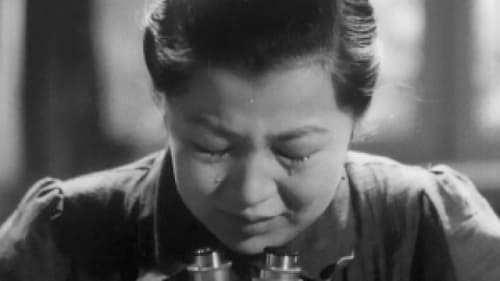
Dormitory worker (uncredited)
Durante la Segunda Guerra Mundial (1939-1945), varias mujeres trabajan en una empresa de instrumentos de óptica. Bajo el control paternalista del director de la fábrica, luchan para conseguir la máxima calidad en difíciles condiciones. A pesar de las enfermedades y los problemas con los que se enfrentan, viven entregadas a su trabajo y a la causa de su país. El jefe de equipo, cuya mujer se está muriendo, se esforzará por dar ejemplo a los demás mostrando una voluntad de acero.

War-time jidaigeki by Eisuke Takizawa. Didn't find anything about it online, but Takizawa was a well-regarded director in his time. Akira Kurosawa worked as A.D. on several of his films.

A bizarre murder at a hot springs resort threatens to disrupt an Edo detective's (Hasegawa) vacation. When his hot-blooded wife (Yamada) starts snooping around, however, he finds himself reluctantly drawn in to the case.

Set in Qingdao, China, a Japanese company locates an office there and begins work and cooperation with a local Chinese company for business. Many Japanese engineers also move to China, with their families, for the company in order to construct a canal. There are young Chinese resisting the Japanese in this area.

Nikichi
This epic depicts the battle between Uesugi Kenshin and Takeda Shingen. The focus of the story is the struggle by the unit leader in charge of the main supply wagons and the supply troops to transport materiel to the Uesugi army. To this are added episodes involving an itinerant woman.

Jurobei, a kaisen tonya (wholesaler in port) in Awa, was wronged and killed on the day of the Dance Festival by the evil merchant & the chamberlin. His brother (Kazuo Hasegawa) vowed vengeance on the day of his brother's death. So every year the villains are worried during the Awa Dance Festival (which is part of the Obon festival), but nothing has ever happened, until seven years later...

Sakai Saemon-no-jo Ietsugu
A sentimental tale of the filial love between shogun Iemitsu (matinee idol Hasegawa) and his loyal old retainer Hikoza (comedian Roppa, playing somewhat against type).

Jidaigeki from 1940

Song of the White Orchid was a co-production of Toho and Mantetsu, the railway that served the colonial region of Manchuria, and the first film in the Kazuo Hasegawa/Shirley Yamaguchi (Ri Koran) “Continental Trilogy.” Handsome Hasegawa (representing Japan) runs up against an impertinent Yamaguchi (representing the continent); not surprisingly, in the course of the film the woman comes around and realizes the benevolent intentions of the Japanese. In Song of the White Orchid Yamaguchi leaves Hasegawa, who plays an expatriate working for the railway, because of a misunderstanding. She joins a communist guerilla group plotting to blow up the Manchurian railway. Learning of the subterfuge that led to the misunderstanding, she renews her faith in Hasegawa—and by extension Japan—and tries to undermine the plot.

The film recounts the tragedy of a young outlaw.

Pre-war jidaigeki film from 1936, produced by Uzumasa Hassei Eiga studios

Prewar jidaigeki starring Denjiro Okochi

The sequel to the 1935 film Great Bodhisattva Pass

En 1936, el director Tomu Uchida llevó al cine la primera parte de la novela El teatro de la vida, que basándose en el retrato de la corrupción de un hombre y la mujer que desairó, se centra en la juventud del personaje.

Japanese historical film.

Directed by Kenji Mizoguchi. Released in 2 parts. His only release of 1931

Dewanokami Nakamura
Tōjin Okichi is a 1930 film by Kenji Mizoguchi based on the novel by Gisaburo Juichiya. Only 4 minutes have survived. The fragment has been published on DVD coupled with The Downfall of Osen (1935) by Digital MEME in 2007.

A film adaptation of the play by Leo Tolstoy.

Policeman
'Armed Robber Shimizu Sadakicchi' is considered Japan's debut film and came on the heels of the country obtaining its first film camera. It famously was only a couple of minutes' long as its film reel was only seventy feet long. It featured who is considered to be Japan's first film actor Unpei Yokoyama who was one of two actors in the film. It features one scene where a robber is apprehended by the police.



























